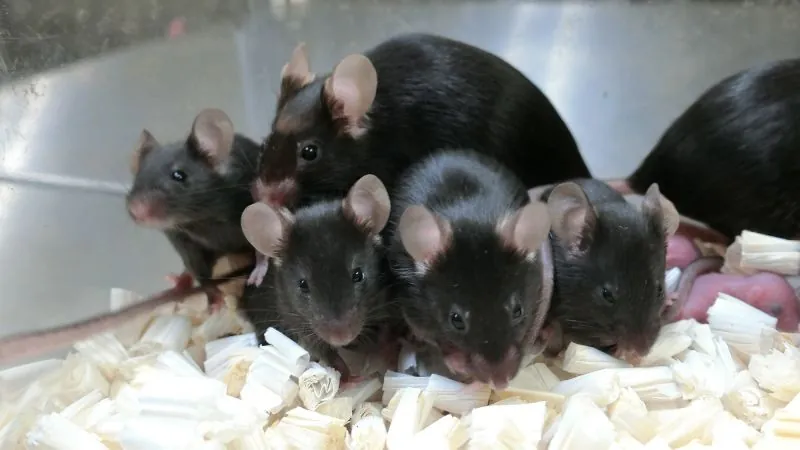
Are Mouse Sperm in Space Key to Humanity's Future?
2024-12-16
Author: Chun
In recent years, planet Earth has faced unprecedented challenges, from a global pandemic to waves of staggering heat and devastating natural disasters. These events highlight an urgent need for humanity to find alternate habitats, according to advocates of space colonization. Proposals for establishing outposts on the Moon or Mars could serve as crucial safeguards against the threat of extinction due to catastrophic events or self-inflicted dangers.
But as we contemplate life beyond our home planet, one critical question looms: Can we reproduce in space? Current efforts by scientists are beginning to answer this by sending freeze-dried mouse sperm aboard the International Space Station (ISS). These specimens are safely stored in a radiation-protected box, awaiting their return to Earth next year. The aim is to study how the unique conditions of space affect mammalian reproduction, potentially unlocking the secrets to sustaining life on other planets.
Professor Teruhiko Wakayama, from the Advanced Biotechnology Centre at the University of Yamanashi, is leading this groundbreaking research. Upon the return of the mouse sperm to Earth, he plans to analyze the samples to assess their viability for creating healthy offspring in a zero-gravity environment. Furthermore, Wakayama is developing an innovative device that will allow astronauts to perform rodent in vitro fertilization (IVF) aboard the ISS, creating exciting possibilities for the future of human reproduction in space.
"Our goal is to establish a secure system for preserving Earth's genetic resources in space—be it on the Moon or Mars—so that life can be revived, even in the face of catastrophic destruction of our home planet," Wakayama states.
This ambitious project may sound like science fiction, but Wakayama's work has historical significance. In 1997, he helped create the world's first cloned mouse from adult cells. His previous research involved developing mouse embryos in a space environment, a feat previously only achieved with simpler organisms.
Notably, experiments with the freezing and rehydrating of sperm have shown promising results, with samples remaining viable for up to 200 years in space. However, Wakayama emphasizes that this duration is not sufficient for long-term missions, prompting him to explore methods for storing sperm at room temperature while protecting it from radiation.
The fascination with conducting biological experiments in space isn't new. Over the decades, scientists have launched various Earthly organisms for research on how microgravity and cosmic radiation influence biological processes, particularly reproduction. A memorable case was the "Chix in Space" experiment in 1989 when fertilized chicken eggs were sent into orbit to study their development without the influence of gravity. In 1992, tadpoles became the first vertebrates to hatch in space, demonstrating distinct adjustments to their new environment.
Virginia Wotring, a professor at the International Space University, notes that while we’ve witnessed reproductive cycles in species like medaka fish and snails in space, studying mammals represents the next crucial step. "Going to mammals is the next natural progression to see which aspects of reproduction are feasible in microgravity."
As we inch closer to a multi-planet existence—with NASA's Artemis program set to return astronauts to the Moon in late 2026 and Elon Musk’s plans for a manned mission to Mars—understanding how we can sustain human life, including reproduction, will become increasingly important.
However, current space travel poses significant risks to human health. Conditions such as cosmic radiation can lead to DNA mutations linked to cancer, while microgravity can cause vision issues and muscle and bone degradation. Wotring emphasizes that the immediate priority should be ensuring the well-being of astronauts currently venturing into space, although Wakayama remains steadfast in the belief that successful reproduction studies in space will be essential as humans extend their time among the stars.
Wakayama's aspirations don’t stop at mice. He believes that findings from his research could also facilitate the transportation of other species, possibly bringing animals like dogs for companionship or livestock for sustenance to extraterrestrial outposts.
With plans underway to launch his IVF device to the ISS within two years, Wakayama is optimistic. "In science fiction, people live on other planets and babies are born, but we still don’t know if that’s feasible," he asserts. His experiments may provide the answers we need on whether human life can continue in the harsh realities of space.
"If we can confirm viability, it will provide reassurance about our ability to thrive off Earth; but if not, we must understand the challenges we face," Wakayama concludes, underscoring the significance of this research for the future of humanity.
The question remains: could the fate of humanity really hinge on tiny mouse sperm drifting among the stars? The answers may lie just beyond our atmosphere.




 Brasil (PT)
Brasil (PT)
 Canada (EN)
Canada (EN)
 Chile (ES)
Chile (ES)
 España (ES)
España (ES)
 France (FR)
France (FR)
 Hong Kong (EN)
Hong Kong (EN)
 Italia (IT)
Italia (IT)
 日本 (JA)
日本 (JA)
 Magyarország (HU)
Magyarország (HU)
 Norge (NO)
Norge (NO)
 Polska (PL)
Polska (PL)
 Schweiz (DE)
Schweiz (DE)
 Singapore (EN)
Singapore (EN)
 Sverige (SV)
Sverige (SV)
 Suomi (FI)
Suomi (FI)
 Türkiye (TR)
Türkiye (TR)